- Become a Student
- Majors
- Associate Degrees
- Bachelor Degrees
- Accounting
- Biology
- Biomedical Laboratory Science
- Business Administration
- Computer Systems Management
- Creative Technologies
- Criminal Justice
- Data Intelligence
- Education DegreesElementary, Middle Grades, Secondary
- Exercise & Sport Science
- Homeland Security
- Interdisciplinary Studies
- Justice Administration
- Literature and Media
- Management
- Marketing
- Medical Laboratory ScienceMLS 2+2, MLS Post-Baccalaureate
- NursingRN-BSN, RN-MSN, RN-MSN/MBA
- Psychology
- Rehabilitation Studies
- Social Work (BSW)
- Supply Chain Management
- Minors
- Graduate Degrees
- Business Administration (MBA)
- CounselingAddictions, School Counseling, Mental Health, Rehabilitation
- Education Graduate DegreesCurriculum & Instruction, Elementary, Educational Leadership, Middle Grades, Secondary, Teacher Leadership, Master of Arts in Teaching (Initial Certification)
- Human Resource Management
- NursingMSN, RN-MSN, MSN-MBA
- Online Programs
- Is Online for Me?
- Undergraduate Programs
- Accounting
- Biomedical Laboratory Science
- Business Administration
- Computer Systems Management
- Criminal Justice
- Data Intelligence
- Exercise & Sport Science
- Homeland Security
- Justice Administration
- Law Enforcement
- Management
- Marketing
- Medical Laboratory ScienceMLS 2+2, MLS Post-Baccalaureate
- NursingRN-BSN, RN-MSN, RN-MSN/MBA
- Psychology
- Rehabilitation Studies
- Social Work (BSW)
- Supply Chain Management
- Graduate Degrees
- Business Administration (MBA)
- CounselingAddictions, School Counseling, Mental Health, Rehabilitation
- EducationCurriculum & Instruction, Educational Leadership, Elementary, Middle Grades, Secondary, Teacher Leadership, Master of Arts in Teaching (Initial Certification)
- Human Resource Management
- NursingRN-MSN, MSN, MSN-MBA, RN-MSN/MBA
- Cost
- Student Life
- Athletics
- Alumni & Friends
- Training Programs
- AgileFundamentals, SAFe 5.0, Scrum Master 5.0, Product Owner/Manager 5.0, ICP-TST Testing, Lean Portfolio Management, SAFe Architects 5.0
- Agile BootcampsFull Stack Software Developer (ICP, ICP-PRG and ICP-ATA certifications)
- CISCORouting/Switching, Security, Datacenter, Collaboration, Wireless
- Cloud ComputingAmazon Web Services, CompTIA, Google, Microsoft, VMware
- Contract ManagementDAU and FAC-C equivalent training, consulting, workshops
- CompTIAA+, Network+, Security+, CySA, CASP, Project+, Cloud+
- Cyber SecurityCISSP re-certificaton, Certified Ethical Hacker, Security+, CySA+, CISA, CCNA Security (SIMOS, SENSS, SITCS)
- ITILFoundation, Practitioner
- MicrosoftWindows Client, Server 2019, Office 365, Azure, Sharepoint
- Project ManagementPMP, Project Management -Agile, Project Management Associate, Lean Six Sigma
- Customized Training
- About


